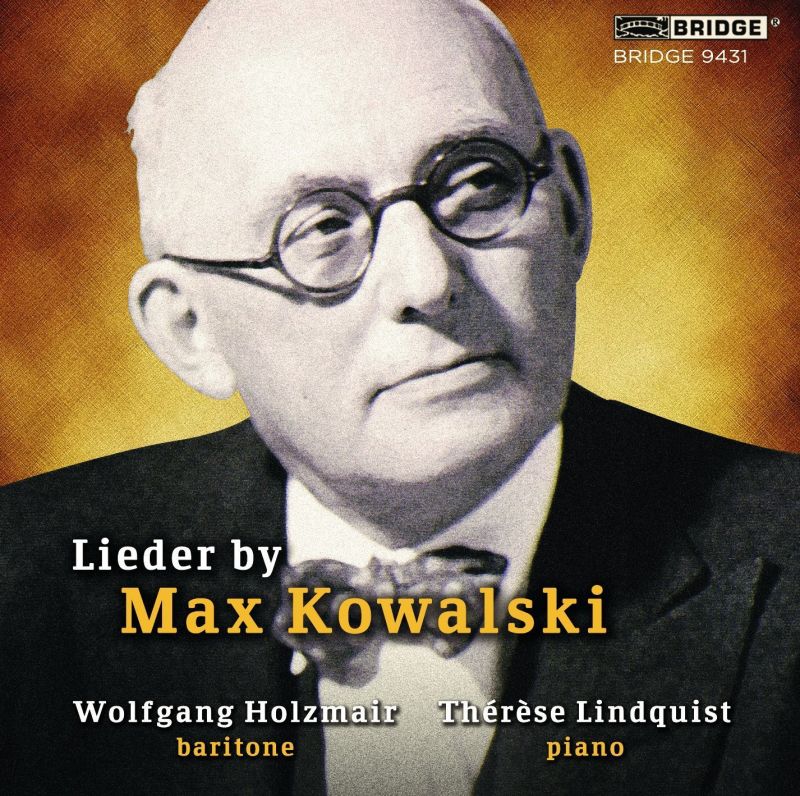KOWALSKI Lieder
View record and artist detailsRecord and Artist Details
Composer or Director: Max Kowalski
Genre:
Vocal
Label: Bridge
Magazine Review Date: 08/2015
Media Format: CD or Download
Media Runtime: 61
Mastering:
DDD
Catalogue Number: BRIDGE9431

Tracks:
| Composition | Artist Credit |
|---|---|
| Acht Lieder auf Gedichte von Hafis |
Max Kowalski, Composer
Max Kowalski, Composer Thérèse Lindquist, Piano Wolfgang Holzmair, Baritone |
| Ein schöner Stern geht auf in meiner Nacht |
Max Kowalski, Composer
Max Kowalski, Composer Thérèse Lindquist, Piano Wolfgang Holzmair, Baritone |
| Der Frühling |
Max Kowalski, Composer
Max Kowalski, Composer Thérèse Lindquist, Piano Wolfgang Holzmair, Baritone |
| Nachtergräusche |
Max Kowalski, Composer
Max Kowalski, Composer Thérèse Lindquist, Piano Wolfgang Holzmair, Baritone |
| Reifefreuden |
Max Kowalski, Composer
Max Kowalski, Composer Thérèse Lindquist, Piano Wolfgang Holzmair, Baritone |
| Pierrot Lunaire |
Max Kowalski, Composer
Max Kowalski, Composer Thérèse Lindquist, Piano Wolfgang Holzmair, Baritone |
| Ernste Stunde |
Max Kowalski, Composer
Max Kowalski, Composer Thérèse Lindquist, Piano Wolfgang Holzmair, Baritone |
| Immer wieder |
Max Kowalski, Composer
Max Kowalski, Composer Thérèse Lindquist, Piano Wolfgang Holzmair, Baritone |
| Der Panther |
Max Kowalski, Composer
Max Kowalski, Composer Thérèse Lindquist, Piano Wolfgang Holzmair, Baritone |
| Liebeslied |
Max Kowalski, Composer
Max Kowalski, Composer Thérèse Lindquist, Piano Wolfgang Holzmair, Baritone |
Author: Tim Ashley
His work is currently undergoing reappraisal as a part of the continuing re-evaluation of ‘Entartete Musik’, and Wolfgang Holzmair undertook a recital of his songs in Munich in 2011, when this live recording was made. Pierrot lunaire, inevitably perhaps, is the centrepiece, though many, I suspect, will find the late (1946) Hafiz cycle the greater work, and be even more struck by the stark group of Rilke settings that brings the disc to a close. Wolf’s influence is very apparent in Pierrot, where fleeting allusions to the Mignon’s ‘So lasst mich scheinen’ mark Kowalski’s hero out as heir to German traditions of Romantic melancholy. Elsewhere, the shifting major-minor tonalities and winding, elusive vocal lines bring him closer to Zemlinsky than anyone else. Holzmair sings it all with an immaculate style that admirably fuses sound and sense, though he sometimes finds Pierrot’s big vocal spans uncomfortably wide. Thérèse Lundquist tackles the accompaniments, some of them almost Lisztian in their complexity, with terrific aplomb.
Discover the world's largest classical music catalogue with Presto Music.

Gramophone Digital Club
- Digital Edition
- Digital Archive
- Reviews Database
- Full website access
From £8.75 / month
Subscribe
Gramophone Full Club
- Print Edition
- Digital Edition
- Digital Archive
- Reviews Database
- Full website access
From £11.00 / month
Subscribe
If you are a library, university or other organisation that would be interested in an institutional subscription to Gramophone please click here for further information.




